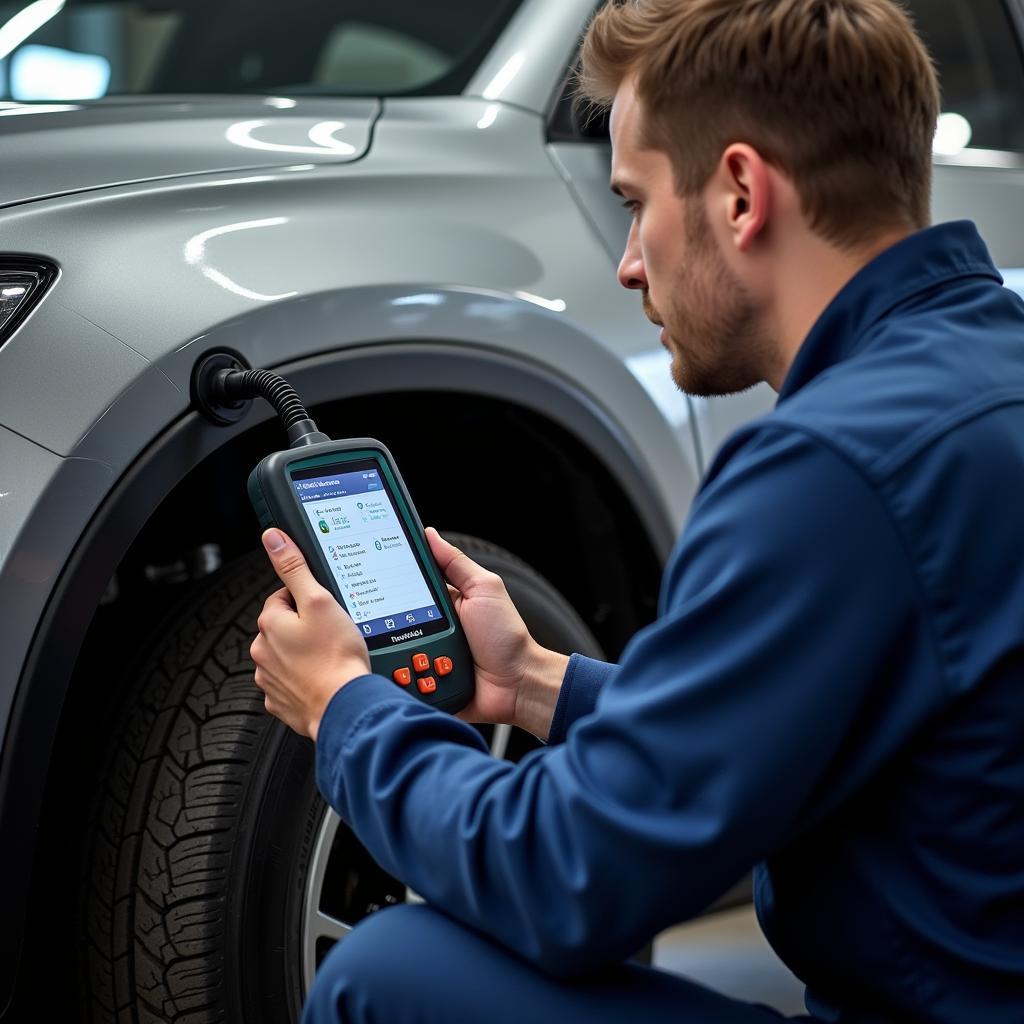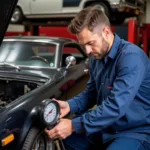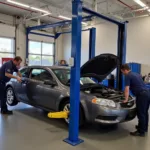Car noise can be incredibly frustrating, distracting, and even a safety concern. Knowing How To Beat Car Noise Repair means understanding the causes, identifying the problem, and finding the most effective solution. Whether it’s a squeal, a rattle, a thump, or a whine, this guide will equip you with the knowledge to tackle unwanted car noises and potentially save you money in the process.
Understanding Common Car Noises
Before diving into solutions, it’s essential to understand the different types of car noises and their potential causes. A high-pitched squeal might indicate worn brake pads, while a rhythmic thumping could point to a tire issue. A grinding noise when shifting gears might signal transmission problems, and a clicking sound from the engine compartment could be a sign of a failing valve lifter. Identifying the type of noise is the first step in effective car noise repair.
Identifying Noises from the Brakes
Brake noises are among the most common and often the easiest to diagnose. A high-pitched squeal when braking is often caused by worn brake pads, designed to alert you when they need replacement. A grinding noise, however, signifies that the brake pads are completely worn down and metal is rubbing against metal. This requires immediate attention to prevent further damage to the rotors.
Diagnosing Tire Noises
Tire noises can manifest in various ways. A rhythmic thumping or bumping sound, especially at higher speeds, often indicates a flat spot on a tire, an out-of-balance wheel, or a damaged tire. A humming or whining noise that changes with speed can point to a worn wheel bearing. Regular tire rotations and balancing can help prevent many tire-related noises.
Recognizing Engine Noises
Engine noises are more varied and can be harder to diagnose. A knocking or tapping sound could indicate a problem with the rod bearings, pistons, or valves. A hissing sound might suggest a vacuum leak. A whining noise that changes with engine RPM could be a sign of a failing alternator or power steering pump.
How to Beat Car Noise Repair Costs
While some car noises require professional attention, there are several steps you can take to potentially avoid expensive repairs:
- Regular Maintenance: Regular oil changes, tire rotations, and other routine maintenance can prevent many noise-related issues.
- Visual Inspections: Regularly inspect your tires, brakes, and other visible components for signs of wear or damage.
- DIY Repairs: Simple tasks like changing air filters or tightening loose bolts can often resolve minor noises.
- Consult Reliable Resources: Online forums and automotive websites can provide valuable information and troubleshooting tips.
DIY Troubleshooting for Common Car Noises
Before rushing to a mechanic, consider these DIY troubleshooting steps:
- Identify the Noise: Pinpoint the type of noise, its location, and when it occurs.
- Check the Obvious: Inspect tires for wear and tear, check fluid levels, and look for loose components.
- Consult Online Resources: Search for similar noise descriptions and potential solutions.
- Try Simple Fixes: Tighten loose bolts, lubricate moving parts, and clean dirty components.
When to Seek Professional Help
While DIY troubleshooting can be effective for minor noises, some issues require professional expertise. If you experience complex noises, unusual vibrations, or warning lights, it’s best to consult a qualified mechanic.
 Mechanic using a diagnostic tool to identify the source of a car noise
Mechanic using a diagnostic tool to identify the source of a car noise
Conclusion
Beating car noise repair involves understanding the different types of noises, identifying their potential causes, and taking proactive steps to address them. By following the tips and strategies outlined in this guide, you can effectively tackle unwanted car noises and potentially save money on repairs. Don’t let annoying car noises drive you crazy – take control and enjoy a quieter, more comfortable ride.
FAQ
- What are the most common car noises? Squealing brakes, thumping tires, and knocking engines are among the most common.
- How can I tell if a noise is serious? Loud, persistent, or unusual noises, especially accompanied by vibrations or warning lights, should be checked by a mechanic.
- Can I fix car noises myself? Some minor noises can be addressed with DIY repairs, but complex issues require professional help.
- How often should I check my car for noises? Regular visual inspections and routine maintenance are essential for preventing noise-related problems.
- What is the best way to identify the source of a car noise? Pay attention to the type of noise, its location, and when it occurs.
- How can I prevent car noises? Regular maintenance, visual inspections, and prompt attention to minor issues can help prevent many car noises.
- Is it safe to drive with car noises? Some noises may indicate safety concerns, so it’s best to address them promptly.
Need help? Contact us via WhatsApp: +1(641)206-8880, Email: [email protected]. We have a 24/7 customer support team.
You might also be interested in these related articles:
- Understanding Car Maintenance Schedules
- Troubleshooting Common Car Problems
- How to Choose a Reliable Mechanic
If you have any more questions or need personalized advice, don’t hesitate to reach out to our experts.


